The first article by M. D. P. [Mason D. Pratt] describes a field trip to an iron forge near Pine Grove, followed by a picnic at the grove with the students, teachers, visiting chiefs, the college band and some invited guests. “An Indian Boy's Camp Life,” by Henry C. Roman Nose, gives a short account of his activities growing up. An "Editorial"…
Field Trips
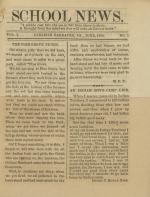
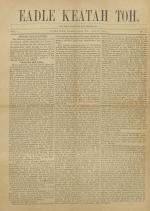
Page one had an article on the benefits all children of the Sioux Nation receive from the agency, and how adult should have the opportunity to learn English as well. There was statistics on the number of children attending, and the ratio of boys to girls. Page two had a piece about the student’s reaction to a camping trip. Many of them reacted…

An excursion to Warm Spring opened this edition, titled “The Camp at the Warm Springs” by John Downing (Cherokee). They hiked all day until they reached the Springs, picking black berries along the way and at one point believing they had gotten lost. This proceeded an editorial on the benefits of sending Indian children to school, which was…
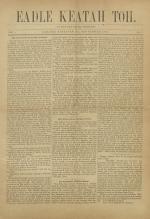
Page one opened with the discovery of a Cherokee tribe in the mountains of South Carolina and how they begged for teaches when the white travelers passed through their village. The Indian bow and white man musket were also compared on page one, with the bow being determined to be the superior weapon. It also described an Indian Buffalo hunt,…
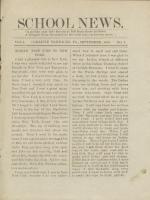
The opening piece was written by Roman Nose, titled “Roman Nose Goes to New York,” and it tell of his trip to New York City, visiting the Equitable Life Insurance Building and the aquarium, and the follows few weeks after his trip. He was one of the students who went on the Warm Springs trip mentioned in the previous issue. The following page…
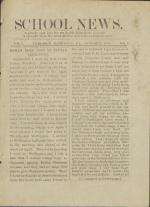
The fifth issue opens with Roman Nose describing his trip back to Indian Territory and his reunion with his family. While there he expresses his enjoyment of the school and the benefits of education, eventually convincing the chiefs to sends twenty-one Cheyenne children and Ten Arapahoe children with him to Carlisle. The article continues onto…
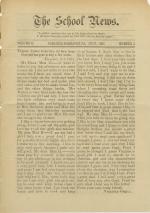
The entire first page is a letter from Virginia Oequa (Kiowa) to her teacher Miss H, sent after she left Carlisle to work on a farm for a few weeks. She sent her love and explained the pride she took in her work. Page two had two articles on the shooting of President James Garfield, written by Samuel Townsend (Pawnee) and Robert W. Stewart (…
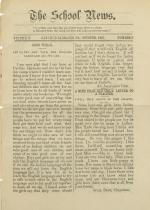
The first page has an article on Indian children learning to take care of themselves when their grown, like the white people do. It also had mentions of the benefits of forgetting Indian language. Julia Bent (Cheyenne) also wrote about the Chapel and her interactions Captain Pratt, and Miss Hyde. Page two had an article on the boys attending…
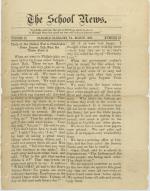
The first page opened with Dessie Prescott narrating the school trip to Philadelphia. While there, they saw toys, went to the Grand Depot, and sang for money for the school. Page two had an article about Tobacco, its side effects, and why it should not be used. Following was a letter exchange between Ellis Childers (Creek) and Mr. C. Kihega…
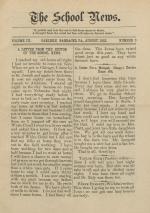
On page one the paper’s editor, Charles Kihega (Iowa) wrote a letter about his successful journey home. Metopah (Osage), Taylor Ealy (Pueblo), and Frank Everett (Wichita) also wrote letters from their outing locations back to the school. On page two eight boys and twelve girls took a trip to explore Luray Cave. Also on the same page Van Horn (…
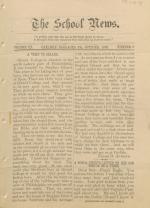
Page one had Frank D. Aveline wrote on visiting Girard College where he and other Carlisle students saw the Girard students do their drills, toured the founder’s house, and attended chapel. A Ponca chief also wrote a letter to his son Frank Eagle who was attending school at Carlisle. Page two mentioned the bi-centennial of William Penn making a…
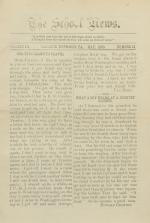
Page one reprinted Van Horn's letter to friend, in which he described his train ride into Trenton, New Jersey, and a drunken old man who disturbed him on the ride. Howard Chawhip also retold a story of an old drunkard who only went to church to hear the singing, but later became a good man after a fly caused him to uncover his ears during…
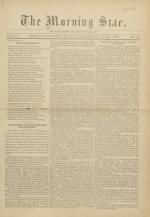
Page one had a poem titled “The Law of Liberty” followed by an article titled “The Republic in a Death Struggle with Ignorance” and comparison between the African and the Indian problem. Page two asked who was responsible for Indians having not fully “Christianized” and become “civil” and an article on the demoralizing old policy and how it has…
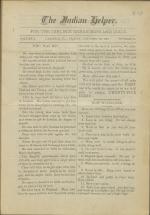
The first page opened with a poem titled "Who Was He?" asking students to come up with an answer for a prize of 25 cents. Also on the first page was a list of twelve steps for "How to Succeed." Page two included news briefs about the weather and keeping warm, President Cleveland’s activities, a West Virginia coal mine accident, sloppy marching…
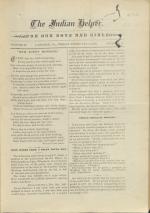
The first page opened with the poem, "New Every Morning" by Susan Coolidge, followed by "Good Words from a Blind Young Man," which was a typewritten letter sent by Joseph Link, student of the Institution of the Blind, to Charles Wheelock (Oneida). There was also an article reprinted from the Truckee (Cal.) Republican, titled "Indian…
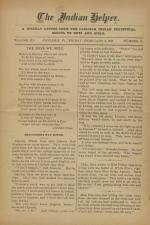
The first page opened with a poem, "Big Fraid and Little Fraid" followed by an article, "Another Pleasant Evening in the Chapel," that detailed the entertainment featuring numerous students reciting or singing poems, songs and reports. It continued on page four, which is missing from the collection. Page two included a reference to the borough'…
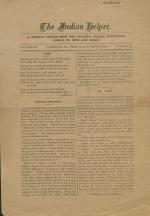
The first page opened with a poem, "Dare," followed by a story, "Engines and Boys," that reported the arrival by train of the new fire engine called "Uncle Sam." Then came a piece entitled, "Be Neat," on the importance of being neat and orderly. It continued on page four. Page two reported the experience of the four girls who visited the White…
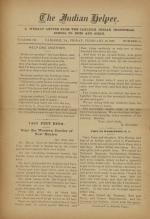
The first page opened with a poem, "Help One Another," reprinted from "Chambers, Journal;" followed by "7482 Feet High," a letter to the Man-on-the-Band-Stand from M. Burgess, about her journey to California. This page also began a letter from Peoria student Edith Abner, entitled "Visit to Washington D.C." which continued on the fourth page.…
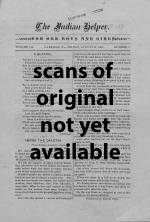
The first page opened with the poem, " A Proverb," followed by Jemima Wheelock's (Oneida) report of "Our Wilmington Trip," about a group of students traveling to Delaware where they stayed with families before they headed to Philadelphia with Capt. Pratt and Miss Leverett. They visited John Wannamaker's Store, the zoo, an iron factory and…
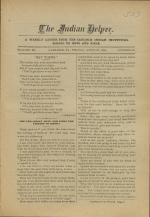
The first page opened with a poem, "Get There," followed by an editorial from Ethildred B Barry of Germantown, called "Are the Indian Boys and Girls the Friends of Birds?," on the treatment of birds. It continued on the fourth page. Page two opened with a piece describing the contents of the April "Red Man," a report from Susan Longstreth…
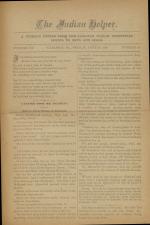
The first page opened with an untitled poem, followed by “A Letter from Mr. Standing: How He Finds Things in England,” a travel diary of the Standing Family’s visit to England. Page two included a report of “An Aged Friend,” and news about visits Dr. Given made to Outing students in Bucks County. It also reported a Department of Interior…
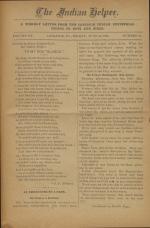
The first page opened with a poem “Selected by Susan Longstreth,” titled “To My Dog ‘Blanco’” by J.G. Holland. The other feature on the first page was an account of “An Indian Girl on a Farm: She Enjoys a Holiday,” that described Adelia Lowe (Sioux) and Frances King’s (Quapaw) trip to Burlington, New Jersey, which continued on the fourth page.…
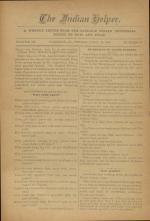
The first page opened with the death notice for Katie Kinshone, one of the Apache babies. It was followed by a poem by Henry Sargent Blake called “Why Come They?” The next item was an article, “No Tobacco in Other Schools,” about the evils of tobacco use and the last piece on the page was an excerpt from an Oneida boy’s outing letter called “…
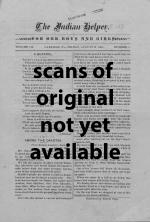
The first page opened with a poem, “Grasp the Nettle,” followed by a reprinted letter to Superintendent Pratt from Conrad Roubideaux (Sioux) titled “Conrad Didn’t Give Up the Ship,” in which he described the hardships of finding work on the reservation. Page two included news that Pratt was out West soliciting signatures for the Severalty Bill…
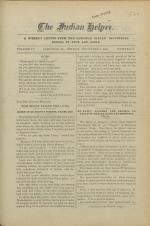
This issue opened with a poem titled “HOW," by John Boyle O'Reilly, followed by news from a letter from Carlisle alumnus Samuel Townsend (Pawnee), a student at Marietta College. Page two included news items about Congress convening, Nancy Cornelius (Oneida) attending the Woman's National Indian Association, new arrivals, "Thanksgiving Echoes…
